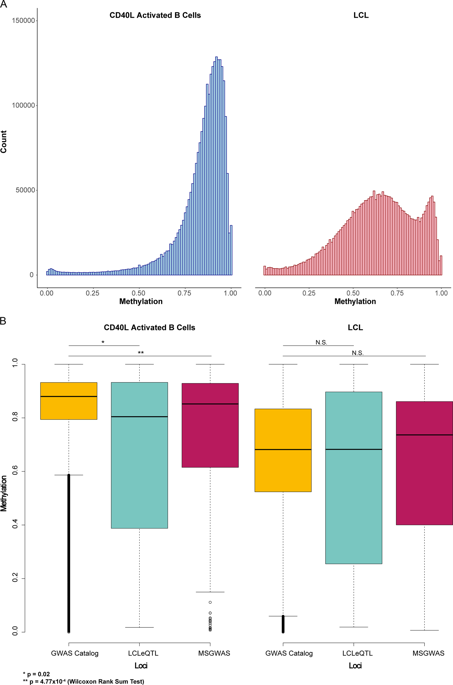当前位置:
X-MOL 学术
›
Genes. Immun.
›
论文详情
Our official English website, www.x-mol.net, welcomes your
feedback! (Note: you will need to create a separate account there.)
Transcribed B lymphocyte genes and multiple sclerosis risk genes are underrepresented in Epstein-Barr Virus hypomethylated regions.
Genes and Immunity ( IF 5.0 ) Pub Date : 2019-10-16 , DOI: 10.1038/s41435-019-0089-5 Lawrence T C Ong 1, 2 , Grant P Parnell 1 , Ali Afrasiabi 1 , Graeme J Stewart 1, 2 , Sanjay Swaminathan 1, 2 , David R Booth 1
Genes and Immunity ( IF 5.0 ) Pub Date : 2019-10-16 , DOI: 10.1038/s41435-019-0089-5 Lawrence T C Ong 1, 2 , Grant P Parnell 1 , Ali Afrasiabi 1 , Graeme J Stewart 1, 2 , Sanjay Swaminathan 1, 2 , David R Booth 1
Affiliation

|
Epstein-Barr Virus (EBV) infection appears to be necessary for the development of Multiple Sclerosis (MS), although the specific mechanisms are unknown. More than 200 single-nucleotide polymorphisms (SNPs) are known to be associated with the risk of developing MS. About a quarter of these are also highly associated with proximal gene expression in B cells infected with EBV (lymphoblastoid cell lines-LCLs). The DNA of LCLs is hypomethylated compared with both uninfected and activated B cells. Since methylation can affect gene expression, and so cell differentiation and immune evasion, we hypothesised that EBV-driven hypomethylation may affect the interaction between EBV infection and MS. We interrogated an existing dataset comprising three individuals with whole-genome bisulfite sequencing data from EBV transformed B cells and CD40L-activated B cells. DNA methylation surrounding MS risk SNPs associated with gene expression in LCLs (LCLeQTL) was less likely to be hypomethylated than randomly selected chromosomal regions. Differential methylation was independent of genomic features such as promoter regions, but genes preferentially expressed in EBV-infected B cells, including the LCLeQTL genes, were underrepresented in the hypomethylated regions. Our data does not indicate MS genetic risk is affected by EBV hypomethylation.
中文翻译:

转录的 B 淋巴细胞基因和多发性硬化症风险基因在 Epstein-Barr 病毒低甲基化区域中代表性不足。
EB 病毒 (EBV) 感染似乎是多发性硬化症 (MS) 发展所必需的,但具体机制尚不清楚。已知超过 200 个单核苷酸多态性 (SNP) 与患 MS 的风险相关。其中大约四分之一也与感染 EBV 的 B 细胞(淋巴母细胞系 -LCL)中的近端基因表达高度相关。与未感染和激活的 B 细胞相比,LCL 的 DNA 甲基化程度较低。由于甲基化会影响基因表达,从而影响细胞分化和免疫逃避,因此我们假设 EBV 驱动的低甲基化可能会影响 EBV 感染与 MS 之间的相互作用。我们询问了一个包含三个个体的现有数据集,其中包含来自 EBV 转化的 B 细胞和 CD40L 激活的 B 细胞的全基因组亚硫酸氢盐测序数据。与随机选择的染色体区域相比,与 LCL (LCLeQTL) 基因表达相关的 MS 风险 SNP 周围的 DNA 甲基化不太可能发生低甲基化。差异甲基化与启动子区域等基因组特征无关,但在 EBV 感染的 B 细胞中优先表达的基因(包括 LCLeQTL 基因)在低甲基化区域中代表性不足。我们的数据并不表明 MS 遗传风险受到 EBV 低甲基化的影响。
更新日期:2019-10-16
中文翻译:

转录的 B 淋巴细胞基因和多发性硬化症风险基因在 Epstein-Barr 病毒低甲基化区域中代表性不足。
EB 病毒 (EBV) 感染似乎是多发性硬化症 (MS) 发展所必需的,但具体机制尚不清楚。已知超过 200 个单核苷酸多态性 (SNP) 与患 MS 的风险相关。其中大约四分之一也与感染 EBV 的 B 细胞(淋巴母细胞系 -LCL)中的近端基因表达高度相关。与未感染和激活的 B 细胞相比,LCL 的 DNA 甲基化程度较低。由于甲基化会影响基因表达,从而影响细胞分化和免疫逃避,因此我们假设 EBV 驱动的低甲基化可能会影响 EBV 感染与 MS 之间的相互作用。我们询问了一个包含三个个体的现有数据集,其中包含来自 EBV 转化的 B 细胞和 CD40L 激活的 B 细胞的全基因组亚硫酸氢盐测序数据。与随机选择的染色体区域相比,与 LCL (LCLeQTL) 基因表达相关的 MS 风险 SNP 周围的 DNA 甲基化不太可能发生低甲基化。差异甲基化与启动子区域等基因组特征无关,但在 EBV 感染的 B 细胞中优先表达的基因(包括 LCLeQTL 基因)在低甲基化区域中代表性不足。我们的数据并不表明 MS 遗传风险受到 EBV 低甲基化的影响。











































 京公网安备 11010802027423号
京公网安备 11010802027423号